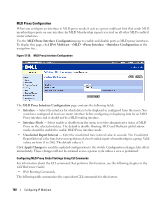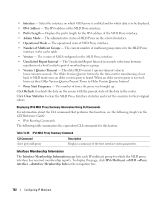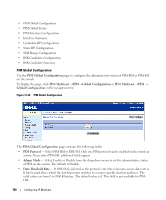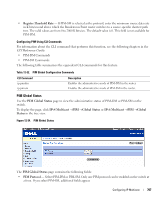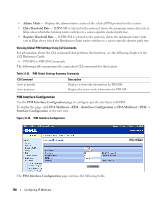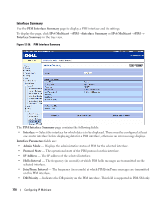Dell PowerConnect 6248 User's Guide - Page 765
Protocol Independent Multicast, PIM-DM, IPv4 Multicast
 |
View all Dell PowerConnect 6248 manuals
Add to My Manuals
Save this manual to your list of manuals |
Page 765 highlights
The following table summarizes the equivalent CLI commands for this feature. Table 12-31. IPv6 MLD Membership Detailed Information Command CLI Command show ipv6 mld-proxy groups detail Description Displays information about multicast groups that MLD Proxy reported. Protocol Independent Multicast Protocol Independent Multicast-Dense Mode (PIM-DM) protocol is a simple, protocol-independent multicast routing protocol. It uses an existing Unicast routing table and a Join/Prune/Graft mechanism to build a tree. PIM-DM creates source-based shortest-path distribution trees that make use of RPF. It cannot be used to build a shared distribution tree, as is the case in PIM-SM. PIM-DM assumes that when a sender starts sending data, all downstream routers and hosts want to receive a multicast datagram. PIM-DM initially floods multicast traffic throughout the network. Routers that do not have any downstream neighbors prune back the unwanted traffic. In addition to PRUNE messages, PIM-DM makes use of graft and assert messages. Graft messages are used whenever a new host wants to join the group. Assert messages are used to shutoff duplicate flows on the same multi-access network. There are two versions of PIM-DM. Version 2 doesn't use the IGMP message; instead, it uses a message that is encapsulated in IP package, with protocol number 103. In Version 2, Hello message is introduced in place of query message. PIM-DM is appropriate for: • Densely distributed receivers • Few senders -to- many receivers (due to frequent flooding) • High volume of multicast traffic • Constant stream of traffic Protocol Independent Multicast-Sparse Mode (PIM-SM) is used to efficiently route multicast traffic to multicast groups that may span wide area networks and where bandwidth is a constraint. PIM-SM uses shared trees by default and implements source-based trees for efficiency. This data threshold rate is used to toggle between trees. PIM-SM assumes that no hosts want the multicast traffic unless they specifically ask for it. It creates a shared distribution tree centered on a defined rendezvous point (RP) from which source traffic is relayed to the receivers. Senders first send the multicast data to the RP, which in turn sends the data down the shared tree to the receivers. Shared trees centered on a RP do not necessarily provide the shortest/optimal path. In such cases, PIM-SM provides a means to switch to more efficient source-specific trees. The PIM menu page contains links to web pages that define and display PIM-DM and PIM-SM parameters and data. Only one PIM protocol can be enabled on the switch at a time. To display the PIM page, click IPv4 Multicast →PIM or IPv6 Multicast →PIM in the tree view. Following are the web pages accessible from this menu page: Configuring IP Multicast 765



